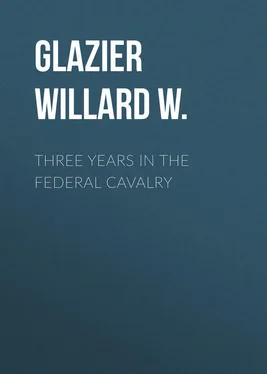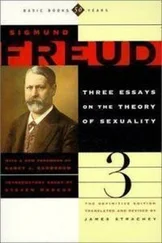Willard Glazier - Three Years in the Federal Cavalry
Здесь есть возможность читать онлайн «Willard Glazier - Three Years in the Federal Cavalry» — ознакомительный отрывок электронной книги совершенно бесплатно, а после прочтения отрывка купить полную версию. В некоторых случаях можно слушать аудио, скачать через торрент в формате fb2 и присутствует краткое содержание. Жанр: История, foreign_antique, foreign_prose, short_story, на английском языке. Описание произведения, (предисловие) а так же отзывы посетителей доступны на портале библиотеки ЛибКат.
- Название:Three Years in the Federal Cavalry
- Автор:
- Жанр:
- Год:неизвестен
- ISBN:нет данных
- Рейтинг книги:4 / 5. Голосов: 1
-
Избранное:Добавить в избранное
- Отзывы:
-
Ваша оценка:
- 80
- 1
- 2
- 3
- 4
- 5
Three Years in the Federal Cavalry: краткое содержание, описание и аннотация
Предлагаем к чтению аннотацию, описание, краткое содержание или предисловие (зависит от того, что написал сам автор книги «Three Years in the Federal Cavalry»). Если вы не нашли необходимую информацию о книге — напишите в комментариях, мы постараемся отыскать её.
Three Years in the Federal Cavalry — читать онлайн ознакомительный отрывок
Ниже представлен текст книги, разбитый по страницам. Система сохранения места последней прочитанной страницы, позволяет с удобством читать онлайн бесплатно книгу «Three Years in the Federal Cavalry», без необходимости каждый раз заново искать на чём Вы остановились. Поставьте закладку, и сможете в любой момент перейти на страницу, на которой закончили чтение.
Интервал:
Закладка:
CHAPTER IV.
THE ADVANCE TO THE RAPPAHANNOCK
1862. – "All quiet along the Potomac." – Preparations. – Army of the Potomac Moves! – Capture of the "Quaker Guns" at Centreville. – Return to Defences. – Guerillas. – Their Attacks and Stratagems. – The Bovine Foe. – Picketing; how it is done. – Sufferings. – McClellan to the Peninsula. – Virginia Weather and the People. – General Augur's Advance to the Rappahannock. – Lieutenant Decker's Bravery and Death. – Night Charge on Falmouth Heights. – Fredericksburg Surrenders. – How Citizens regard us. – Guarding a Train to Thoroughfare Gap. – Fight and Captures at Flipper's Orchard. – Shenandoah Valley. – The Fifth New York Cavalry, First Ira Harris' Guard. – Death of Turner Ashby. – Strange Cavalry Tactics. – Personal Bravery of Captain Hammond. – End of the Peninsular Campaign.
The winter was one of preparation, not of operation. Why we were kept "all quiet along the Potomac," until the announcement, reiterated through the press, elicited only disdainful merriment among our friends, was never satisfactorily explained. The month of December had been beautiful, the roads in excellent condition, the army well supplied and disciplined, so that nothing but hesitancy in our leaders stood in the way of army movements. The North and West, which had supplied myriads of men and millions of money, were becoming very impatient with such a state of things. This feeling was intensified by the fact that it was known that the enemy was tireless in his efforts to increase his army and to fortify his strongholds, while he was also gaining the sympathy of foreign powers, and, by means of blockade-running, was adding not a little to his munitions of war. The army shared largely this general discontent. "Why do we not advance?" was every where the interrogation of eager officers and men.
However, we were not wholly unemployed; for while we waited for reinforcements and cannon, as demanded by the general in command, and for the leaves to fall from the trees to facilitate movements in a country so thickly wooded as is Virginia, we were kept busy with the camp curriculum, namely, the drill, the guard, the inspection, and parade. General Lee's plantation, on Arlington Heights, and the surrounding country, was thoroughly trodden by loyal feet, as men and horses were acquiring the form and power of military life.
But our quiet was to be broken by our grand advance, which commenced on the 3d of March. The Harris Light broke camp at three o'clock in the morning, and, with several regiments of cavalry, under the command of Colonel W. W. Averill, led the advance, the Harris Light having the position of honor as vanguard. We were ordered to move slowly and cautiously, which we did, on the main thoroughfare known as the Little River Turnpike, and, at four o'clock, P. M., we arrived at Fairfax Court House, having marched only about fourteen miles.
What was our surprise to find the place entirely deserted by the enemy, who had left the day previous with the design of retiring beyond the Rappahannock. This change of affairs seemed so sudden as to be full of mystery, and was wholly unknown even to our secret corps. We could not doubt but that this movement was performed in anticipation of some of our contemplated manœuvrings, of which the Rebel leaders are generally informed by their spies in Washington and all through our lines, even before they are known to our army.
Our march was resumed the following day at ten o'clock A. M., and early in the afternoon we captured the "Quaker Guns" at Centreville. The enemy had actually placed in the earthworks or forts which commanded the road, large trunks of trees, resembling cannon of heavy calibre, which frowned down upon us from the heights. Had it not been for the information we had received from contrabands on the march, that the enemy had evacuated, a report confirmed by the curling smoke which rose from various parts of the field, this formidable array of threatening cannon would have terrified us all, and greatly retarded our progress. Indeed, it was not till after the suspicious works had been thoroughly scanned with field-glasses that we were ordered to advance, when the strong position was carried without the snapping of a cap, or a sabre stroke. Chagrin was written upon every face. Not a sign of the enemy was visible, save the deserted remains of their winter-quarters, which fell into our hands.
A very brief halt was here made, and, hurrying our steps, we soon crossed the memorable Bull Run, and came up with the rearguard of the retiring army at Manassas Junction. Here we pitched into them, and kicked up a little dust on the road to Bristoe. This expedition, or wild-goose chase, was continued to Warrenton Junction, where General George D. Stoneman found the enemy in force, but returned without attacking them. Having loitered about these historic fields a few days, our whole force began to fall back towards its old position on the Potomac, establishing our advanced picket-lines, however, as far forward as Centreville, with Fairfax Court House as headquarters. Our line of pickets intercepts the Leesburg turnpike at Drainesville and extends to the Potomac, a distance of about twenty miles.
As guerillas and their brethren, the bushwhackers, infest the country more or less, picketing is dangerous as well as difficult. Between the Rappahannock and the Potomac lies a vast territory which abounds in creeks, marshes, deep, dark forests, with only here and there a village or settlement. A little to the west of this plain extend the Bull Run Mountains, with their ravines and caverns. This is a very fit hiding-place for mischief-makers. The guerillas consist mostly of farmers and mechanics, residents of this region, who, by some means, are exempt from the Rebel conscription. Most of them follow their usual avocations daring the day, and have their rendezvous at night, where they congregate to lay their plans of attack on the pickets.
They resort to every stratagem which a vile and savage spirit could inspire. Sometimes a picket is approached by the stealthiest creeping through the dark thickets, when the unfortunate sentinel is seized and quickly despatched by a bowie-knife, or other like weapon, which a Southron can always use most dexterously. When mere stealth cannot accomplish the task, other methods are used. For instance, on a dark night, a vedette, stationed by a thick underbrush, heard a cow-bell approaching him, and supposing that the accompanying rustle of leaves and crackling of dry limbs was occasioned by a bovine friend, unwittingly suffered himself to be captured by a bushwhacker. But the boys soon learned to be suspicious of every noise they heard; so much so, that one night a picket, hearing footsteps approaching him, cried out, "Halt! Who comes there?" His carbine was instantly brought to a ready, and as no halt occurred nor answer was made, a second challenge was given; but failing to effect any thing, he fired in the direction of the noise, when he distinctly heard a heavy fall, and then groans, as of somebody dying. The sergeant of the post, running up to ascertain the cause of the alarm, found that an unfortunate ox, that had been grazing his way through the forest, lay dying, with his forehead perforated by the faithful sentry's bullet. The incident caused considerable merriment, and the pickets were supplied with poor Confederate beef during the remainder of their term of duty.
But the attacks are frequently of a more disastrous character, resulting in the killing of men and horses, in wounds and in captures. The utmost care and strictest vigilance cannot secure us perfectly from depredations. Our general plan is as follows: The major part of the regiment or picket detail establishes what we denominate the "main reserve" within a mile or two in rear of the centre of the line of vedettes, or at a point where their assistance, in case of an attack, can be secured at any place in the line, at the shortest possible notice. About midway between the main reserve and the picket line are stationed two, three, or four picket reliefs, so situated as to form, with the line of vedettes for a base, a pyramid, with its apex at the main reserve.
Читать дальшеИнтервал:
Закладка:
Похожие книги на «Three Years in the Federal Cavalry»
Представляем Вашему вниманию похожие книги на «Three Years in the Federal Cavalry» списком для выбора. Мы отобрали схожую по названию и смыслу литературу в надежде предоставить читателям больше вариантов отыскать новые, интересные, ещё непрочитанные произведения.
Обсуждение, отзывы о книге «Three Years in the Federal Cavalry» и просто собственные мнения читателей. Оставьте ваши комментарии, напишите, что Вы думаете о произведении, его смысле или главных героях. Укажите что конкретно понравилось, а что нет, и почему Вы так считаете.












